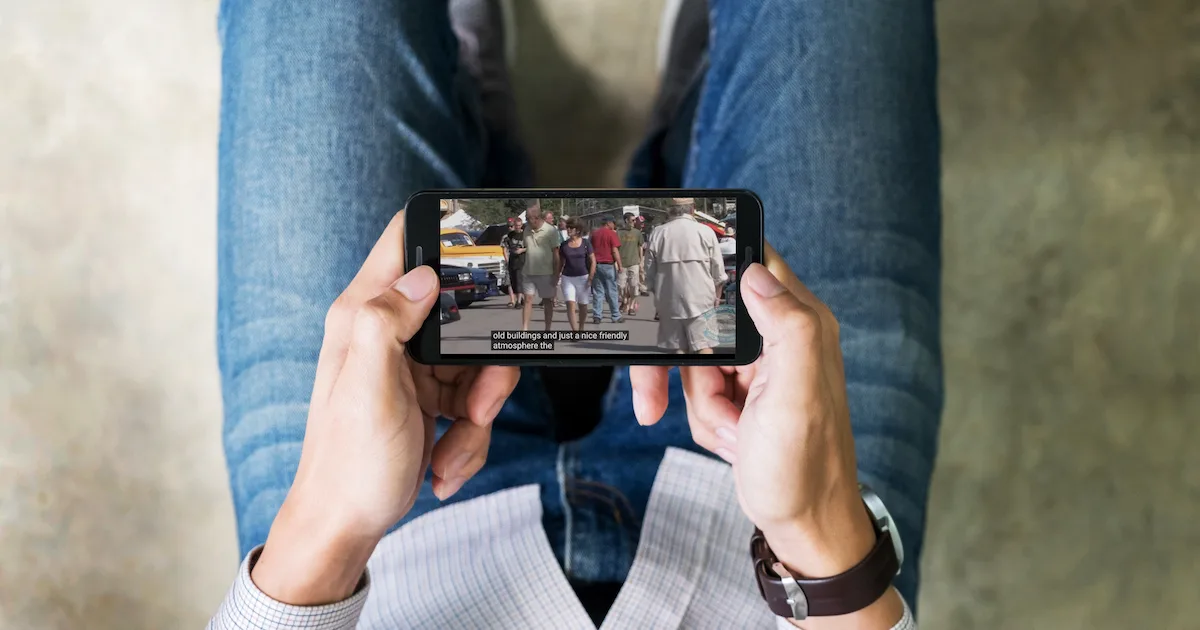Reach More People with Online Closed Captioning

Nowadays, we’re all working, chatting and socializing online, more than ever before. The COVID-19 pandemic has forced us all into a massive virtual connectedness we weren’t 100% prepared for. Decidedly, with all the technology we already had in place (i.e., the internet, smartphones, sophisticated apps), it allowed for a relatively painless transition from real world to virtual world — but we all felt the shift nonetheless.
And along with this recent shift, the internet landscape continues to change rapidly by the minute. Fifteen years ago, it was mainly being used to look up information or to chat with friends. But now, it’s quickly becoming, if not already has become, for many, a primary source of media consumption.
Why You Need to Invest in Online Closed Captioning
People all across the world are consuming video content every day in record numbers. A quick google search pulled up this information: “YouTube has over a billion users, almost one-third of total internet users. 45% of people watch more than an hour of Facebook or YouTube videos a week. More than 500 million hours of videos are watched on YouTube each day. 87% of online marketers use video content.”
With so many people consuming content over the internet, many of them are bound to be living with some type of disability. So, if you’re going to be creating online video content (whether it be live or pre-recorded content), you’ll want to consider having it closed captioned by a captioning professional. Why? Accessibility and inclusivity. Appeal to your audience in large numbers, and garner their admiration in return.
How to Reach More People with Closed Captioning Online
What is Online Closed Captioning? It is the process of adding subtitles, text or other visual information to virtual media platforms. This can include but is not limited to virtual meeting platforms, streaming services and live streaming services.
By captioning your Zoom meetings, live events and video content, they become accessible to each and every one of those content-hungry consumers. Closed captioning provides the accessibility many individuals need to feel included and part of the event, while additionally allowing them a level of participation they may not have had otherwise. Accessibility is so important to those who struggle with limitations.
Businesses, companies, and event planners are all restructuring their events in order to bring them to audiences in an online environment, and they’re realizing that the more accessible the meeting or event is, the better. And that’s where online closed captioning becomes a crucial element that needs to be mixed into the recipe of an online lecture, festival, performance or presentation.
So, as we cocoon and isolate, as we mask up and hunker down, our lives are playing themselves out on the internet. Lectures are no longer in lecture halls, they’re on Facebook live. There’s also YouTube and Zoom (among other platforms), which are being used to livestream film and music festivals as well as concerts and live performances. Also streaming virtually on these same platforms are political debates and cultural discussions. And with today’s technology, they can all be captioned.
The Need for Virtual Closed Captioning
Hard of hearing or hearing impaired persons rely heavily on closed captioning. And if you think that there aren’t “that many” hard of hearing persons you’d potentially be catering to, think again.
“According to Statistics Canada, more than one million adults across the country reported having a hearing-related disability, a number more than 50% greater than the number of people reporting problems with their eyesight (StatsCan, 2002). Other studies indicate that the true number may reach three million or more Canadian adults, as those suffering from hearing problems often under-report their condition.”
Additionally, for those whose first language is not English, statistics have shown they tend to rely on closed captioning too, simply in order to understand and digest the content more efficiently. As a matter of fact, according to a 2011 Statistics Canada census result, over 6.8 million Canadians reported their mother tongue to be a language other than English or French. That is a hefty number of people who may find themselves enjoying, and even preferring, captioned video content.
Others who may be watching with background noise have also been known to find closed captions extremely helpful. Then there are those who fall within the autism, ADD or ADHD spectrum, who are likely candidates in finding online closed captioning beneficial in that, again, their absorption of the material increases considerably.
Some people just enjoy captions and find taking in the content that much easier when they can also read what is being said. In short, for many of us, captions definitely enhance the viewing experience.
Online closed captioning is a helpful tool for a wide range of people and a necessity for others, thus becoming a much-needed addition to your online event. If you are planning a virtual event, get it professionally captioned with ScribeWire.
Online closed captioning is nothing new for us! We are one of Canada’s leading media accessibility companies and have been in the captioning business for over 26 years.
Last updated: January 28, 2021

Kira Yager
As Manager of Scheduling and Communications, Kira brings more than 20 years of media industry experience to her position with ScribeWire. Kira has worked in the radio broadcasting industry as a copywriter, voiceover artist and traffic reporter. She is now applying the many skills she has garnered over the years to ensure ScribeWire continues to thrive in an ever changing, fast-paced media market. Kira holds a bachelor of arts degree in English, Film & Communications from McGill University and in her spare time enjoys reading, writing, and taking long walks with her Australian shepherd, Zenya.
We want to hear from you.
Request a quote, or just let us know how we can make your media accessible.
